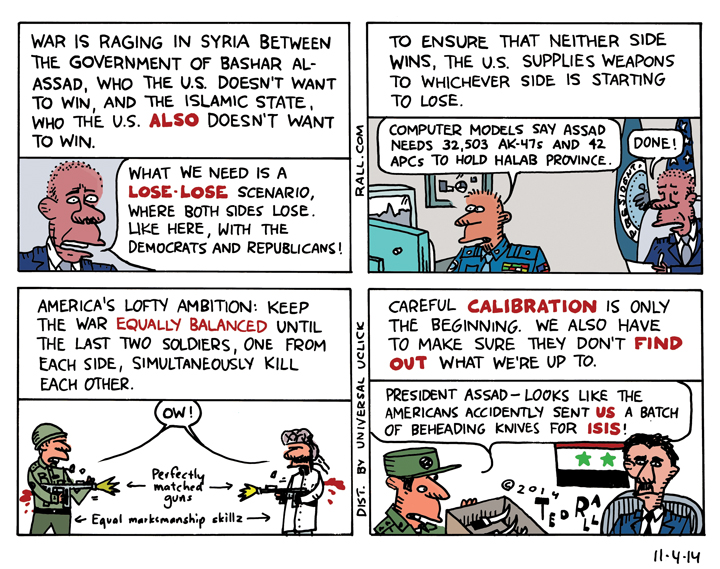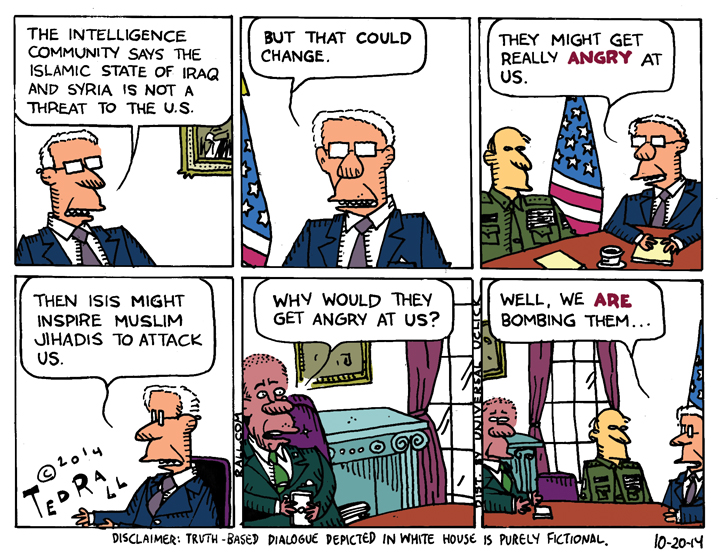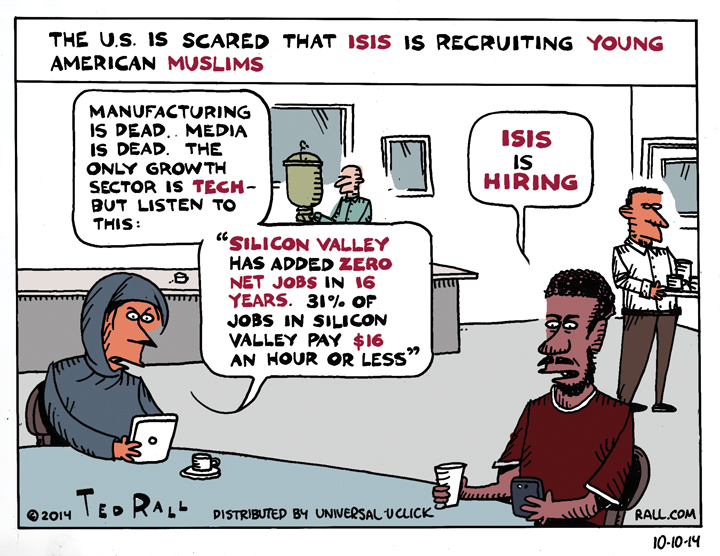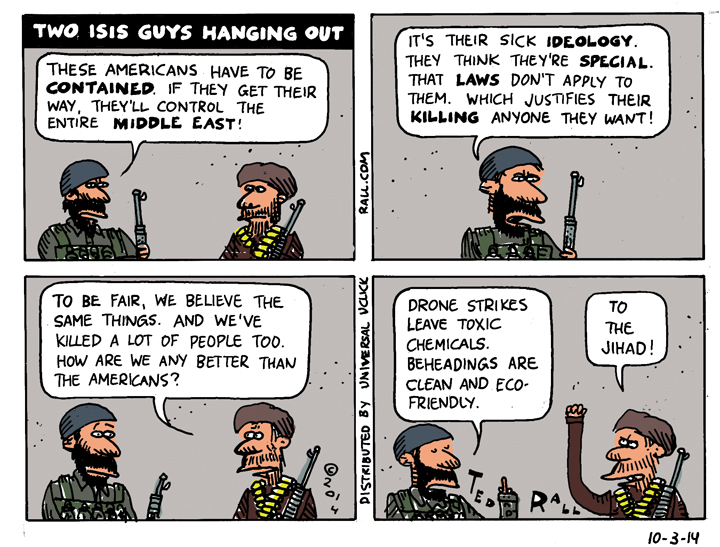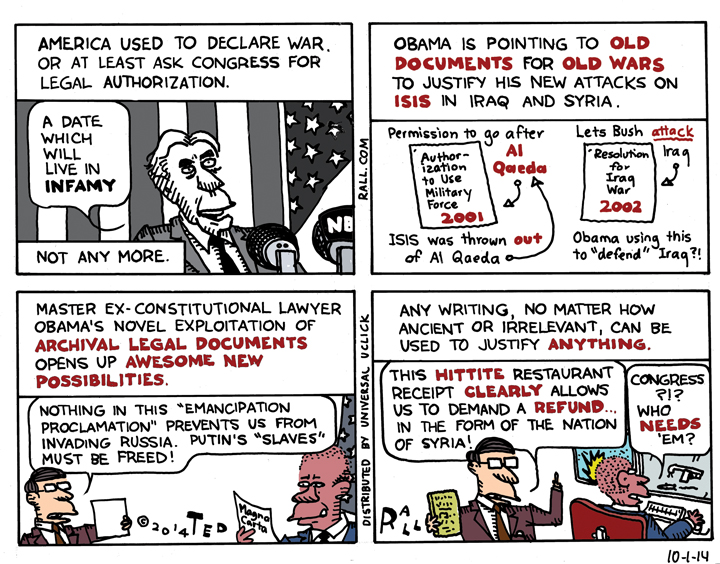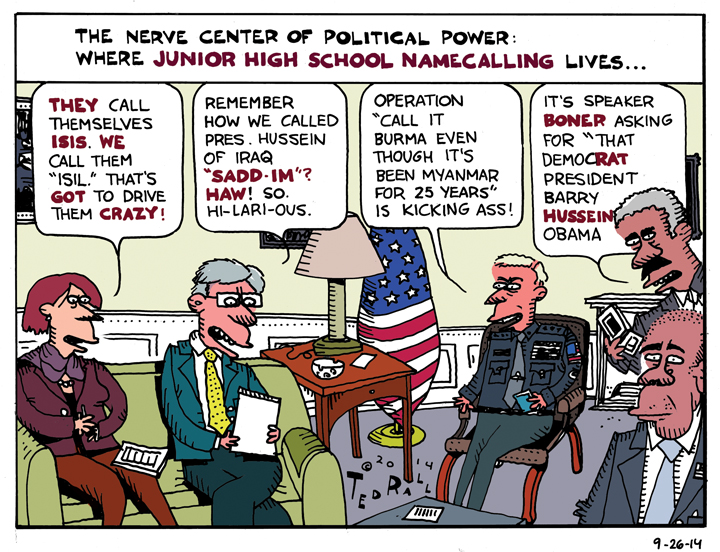War is raging in Syria between the Baathist government of President Bashar al-Assad and the Islamic State (ISIS). The United States doesn’t want either side to win. The solution, naturally, is careful calibration to keep both sides equal until they both kill each other.
SYNDICATED COLUMN: In Defense of Extremism
From The Washington Post: “The cost of turning against the Islamic State was made brutally apparent in the streets of a dusty backwater town in eastern Syria in early August. Over a three-day period, vengeful fighters shelled, beheaded, crucified and shot hundreds of members of the Shaitat tribe after they dared to rise up against the extremists.”
From USA Today: “Contrary to the popular opinion that radical Islam is the primary threat to homeland security, Christianity provides the other four groups with their extremist rationale.”
“Extremism” is the new “terrorism” – a word that so automatically conjures revulsion that its user is under no pressure to justify its use with logic or reason. The U.S. government and those charged with disseminating its propaganda – wait, we’re supposed to call them “talking points” now – in the media like to define themselves as the 50-yard line of politics. Like an ideological Goldilocks, neither too left nor too right but just perfect for this time and place and species, these self-described “centrists” and “moderates” vilify their enemies, opponents, and rivals with the E-word.
Upon examination, however, it becomes clear that few words are less meaningless in political discourse than “extremism.” (At least “terrorism” means something. Terrorism is the use of violence against civilians in order to promote or achieve political ends.)
An extremist is only an extremist in comparison to what is mainstream/centrist/moderate. Whatever system of political, religious or economic belief happens to dominate at a particular moment in time smears its opponents as extreme and therefore beyond normal and acceptable discourse. But that can change. Today’s extremism becomes tomorrow’s moderation under a different system.
(This is even true when the system doesn’t change. In the U.S., 1964 Republican presidential nominee Barry Goldwater was defeated because he was considered a right-wing extremist. Today, 50 years later, he would be too far to the left to be a viable candidate in the Democratic party.)
In the quote from the Washington Post above, the deeds allegedly committed by the Islamic State are violent, brutal and arguably barbaric. But even within the bounds of ideological discourse of mainstream U.S. corporate media, there is nothing “extreme” about what ISIS did. American fighter jets routinely kill civilians in the Middle East with the same impunity – ironically, sometimes while attacking ISIS – the only difference is the weapons and tactics used to achieve the same result: death.
We should demand that journalists use more specific, useful words than “extremist” to describe ideological opponents of the current system, which can credibly be called extremist in a number of important respects.
It’s pretty extreme, for example, to tell sick, poor and unemployed people that they are on their own, responsible for their own trials and tribulations, and should expect no help from their government. Indeed, very few other societies in the West believe such things. Executing the mentally ill makes the U.S. basically unique in the world. And if the “exceptionalist” American legal doctrine that U.S. law applies in every other country, allowing Americans to violate foreign territory and capture suspects of interest to the U.S. isn’t extreme, I don’t know what is.
The media conflates extremism with purism. Islamic State fighters want to restore the medieval Muslim caliphate and governance by Sharia law; those goals indicate fundamentalism or purism, not necessarily extremism.
One measure of an adjective in politics is, does anyone use it to describe themselves? No one calls themselves a terrorist; no group calls itself extreme. When you see those words in print or spoken by a broadcaster, therefore, you know you are looking at a smear, an insult, lazy shorthand masquerading as argument.
Frankly, anyone who has trouble finding legitimate reasons to oppose ISIS – beyond their supposed “extremism” – doesn’t deserve our attention. For starters: ISIS members believe in God; God doesn’t exist. They massacre innocent civilians to carry out ethnic cleansing; a pluralistic world is more interesting than a homogeneous one. Like the Taliban in Afghanistan, they are ignorant, stupid hicks; who else would behead journalists who were willing to let them tell their story? Stupid hicks shouldn’t be in charge of anything.
Most dangerously, if we accept the framing of the current state of affairs as normal and that of groups and people who want to change it as extreme, few people will ever consider alternatives to the way that we do things now. Many Americans still view communism or socialism as beyond the pale, not because of what those ideologies espouse – many of them don’t know – but because they have absorbed decades of government and media propaganda describing them as fringe, weird, extreme. The result is a remarkably incurious, passive citizenry that accepts the status quo merely because it’s the status quo.
Which is pretty extreme.
(Ted Rall, syndicated writer and cartoonist, is the author of the new critically-acclaimed book “After We Kill You, We Will Welcome You Back As Honored Guests: Unembedded in Afghanistan.” Subscribe to Ted Rall at Beacon.)
COPYRIGHT 2014 TED RALL, DISTRIBUTED BY CREATORS.COM
Archival War
FDR asked Congress for a formal Declaration of War against Germany and Japan. Subsequent presidents asked Congress for various forms of legal justifications to attack other nation-states. Now Obama is further eroding Congress’ right to declare war by relying on obselete and irrelevant authorizations for old conflicts.
SYNDICATED COLUMN: Obama a “Reluctant Warrior,” My Ass

David Ignatius is to The Washington Post what Thomas Friedman is to The New York Times, the 50-yard line of the world as seen by political elites. Like Friedman (but minus the Mustachioed One’s tortured syntax and penchant for airport-to-Four-Seasons taxicab policy briefings), Ignatius mirrors the views of our wealthy, powerful and oblivious leaders at any given hour of the day.
Like the president and his advisors and Congress and the Pentagon brass, he never spies a crisis abroad that couldn’t be improved by firing explosives at it. Long after everyone, including even the media, tires of the carnage (in Iraq, in Afghanistan, etc.), he continues to defend it until the war’s approval ratings dip into fractions of a percentage point, at which point he pivots, bravely arguing that intervention is a mistake.
At this writing, we are at the start of America’s war cycle: (post-beheading video) anger, bombing, more bombing, withdrawal.
Obama’s bombing campaign against ISIS (the Islamic State of Iraq and Syria) in Syria is in its larval form. Which means Ignatius is cheerleading what the U.S. does best: turning living human beings into corpses.
Ignatius, a right-winger, is more pro-war than pro-Republican. Which earns the president official Ignatian praise as — no, really! — a “reluctant warrior.”
Obama, writes Ignatius, “certainly didn’t go looking for another war in the Middle East.” He “contorted himself almost to the breaking point to avoid one.” He “had no choice.”
Ignatius approvingly cites fellow Iraq War neo-con Stephen Hadley (last seen in the desert searching for Saddam’s WMDs, rather than in prison where he belongs): “Hadley noted that Obama’s stance as a reluctant warrior will help him reassure foreigners and Americans alike that this isn’t a reckless, unilatateral U.S. crusade,” Ignatius writes.
Beware of warmongers bearing the “no choice” argument. In matters of war, especially against a foe like ISIS deemed by U.S. government’s own professional intelligence analysts to pose no imminent threat to the U.S., there is always a choice.
To war or not to war?
You might also want to be wary of warmongers whose last war, and the one before, and the one before that, didn’t work out well — guys who are always, reliably wrong. Though, to be fair to Iggy, that’s also true about most of his colleagues.
More galling than Ignatius’ Lucy-and-the-football “no, really, this time really will be awesome” here-we-go-again shtick is this “mainstream” columnist’s belief that Americans can’t remember the last five years of U.S. history.
When it comes to killing, Obama is anything but reluctant. To the contrary — he makes George W. Bush look like a dirty peace hippie.
Barack Obama won the presidency in 2008 by running against the “stupid war” against Iraq. Once in office, however, he issued order after order extending said stupid war with tens of thousands of soldiers and U.S. private “contractors” (corporate mercenaries).
Obama doubled down in Afghanistan with the failed “surge” of additional troops.
It’s pretty much forgotten now, but in 2011 Obama went in deep against Libya, assassinating dictator Col. Moammar Gaddaffi with a drone. The collapse of Gaddaffi’s government opened a vacuum instantly filled by Benghazi-based radical Islamist militias and sparked a civil war that has reduced a formerly viable nation to a failed state.
Speaking of drones…
Does anyone need reminding that Obama aggressively expanded Bush’s illegal program of drone assassinations in Yemen, east Africa and Pakistan, killing thousands of people, 98% or so of whom have been innocent civilians? Or that, rather than grant the victims of the 9/11 attacks justice in the form of a trial, he ordered the assassination and midnight body dump of Osama bin Laden?
From Iraq to Afghanistan to Libya to now Iraq all over again, Barack Obama is as much of a “reluctant warrior” as Genghis Khan.
(Ted Rall, syndicated writer and cartoonist, is the author of the new critically-acclaimed book “After We Kill You, We Will Welcome You Back As Honored Guests: Unembedded in Afghanistan.” Subscribe to Ted Rall at Beacon.)
COPYRIGHT 2014 TED RALL, DISTRIBUTED BY CREATORS.COM
SYNDICATED COLUMN: Obama Trolled by ISIS
President Obama’s reaction to the videos of two American freelance journalists getting beheaded by Islamist militants gives me the uncomfortable feeling that the American people are getting punk’d — again.
The same thing happened 13 years ago this week, when a dozen and a half Muslim fundamentalists attacked our financial and political capitals using our own planes. The hijackers got exactly the reaction that they wanted: overreaction.You should never underestimate an adversary, least of all when their remarkable success against difficult odds have demonstrated the wisdom of their tactics. The Islamic State of Iraq and Syria, like the 9/11-era Al Qaeda from which it split, is not run by stupid people. Stupid people don’t take half of Syria away from its longtime authoritarian dictator – whose armed forces happen to be better equipped and trained – and half of Iraq away from a puppet regime backed by the world’s most ferocious superpower – in two years.
Considering ISIS through the lens of proper respect for their leaders’ intelligence, what were they thinking when they posted those two gruesome videos? Abu Bakr al-Baghdadi, Abu Suleiman al-Naser and other top officials of the Islamic State had to know they would provoke a political reaction. It has: More Americans (94%) are aware of the ISIS execution videos than any other news event in the last five years.
ISIS’ leaders also must have anticipated a military reaction. After the videos, a war-weary American public’s apathetic stance toward the civil war in Syria flipped toward strong support in favor of the bombing campaign announced by Obama (who paradoxically continues to poll poorly on foreign policy).
Clearly ISIS’ top brass believe they stand more to gain than to lose from the coming onslaught by U.S. drones and fighter jets. This should frighten us.
Put yourself into the mindset of the insurgents. Their enemies are the existing governments of the countries they seek to occupy: Syria, Iraq, possibly Jordan, certainly Saudi Arabia and the Gulf states. But – again, like Al Qaeda in the early 2000s – they have a more formidable adversary: moderation.
To survive and expand, radical jihadists don’t need all, or even most, Muslims to join the fight. But they do require the tacit consent of the governed in the areas they control, and the political sympathy that prompts donors to send them the financial contributions that allow them to arm new recruits and hold their territory — factors that fuel legitimacy.
As radicals and fundamentalists, ISIS’ Manichean worldview portrays the West, and especially the United States and Great Britain, and their Middle Eastern client states – obviously Israel most of all – as monsters hell-bent on the oppression of Muslims, the exploitation and appropriation of Muslim lands, using moral corruption and godless capitalism as means toward global domination at their expense.
Until recently, most Muslims – including most Sunnis – didn’t buy it. Hundreds of millions of them drank, smoked, failed to pray regularly, and envied the liberalism and economic power of the West.
The genius of 9/11 was to provoke the United States and its allies into behaving exactly like the monsters Al Qaeda and other jihadist groups had long argued they were. The invasions of Afghanistan and Iraq, brazenly embracing torture and mass kidnappings and opening a gulag archipelago of secret prisons everywhere from Eastern Europe to Guantánamo to jail ships floating in the Indian Ocean, as well as the brazen disregard for innocent civilians demonstrated by Bush and Obama’s willy-nilly drone program, convinced countless fence sitters and former moderates to join the militants, cut them a check, or at least look the other way. By the end of the Bush years, the United States was wildly unpopular, viewed as “violent” and “selfish” throughout the Muslim world.
We got trolled.
The tactics Obama plans to use against ISIS are more of the same. Once again, U.S. warplanes and remote-controlled killer air robots will rain death upon people, the vast majority of whom were innocent and had nothing to do with the group responsible for beheading those poor journalists. Once again, although we will on occasion succeed in killing some #1 or #2 “top terrorist,” we will lose this battle for hearts and minds because (a) the nature of guerrilla warfare is that no leader is indispensable and anyone can and will be replaced, and (b) each civilian death will generate thousands of fierce lifelong enemies – yes, some family members and many friends, but most of all the one group of people American pundits and journalists rarely reference when discussing “collateral damage” – ordinary people, there and in the region and around the world, who react with disgust and rage at our cruelty.
Ironically, disgust and rage are the very same emotions that triggered America’s latest tumble into the Islamist trap.
(Ted Rall, syndicated writer and cartoonist, is the author of “After We Kill You, We Will Welcome You Back As Honored Guests: Unembedded in Afghanistan,” out this week. Subscribe to Ted Rall at Beacon.)
COPYRIGHT 2014 TED RALL, DISTRIBUTED BY CREATORS.COM

